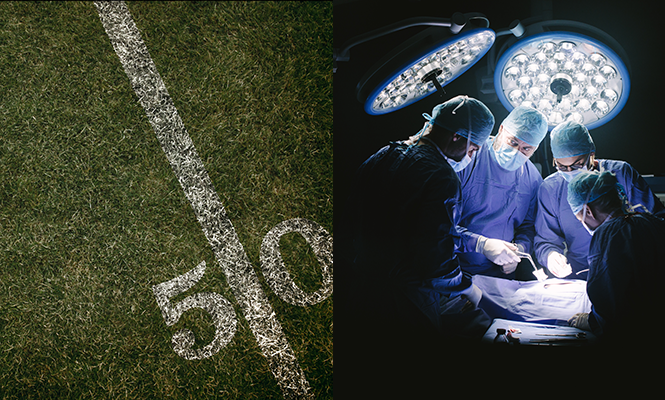What is a sports neurosurgeon and what qualifications are required to become one? Why should a neurosurgeon become involved in the regular care of athletes? How does one prepare for a career in this emerging field?
Evolution of a Sports Neurosurgeon
These are some of the questions that I have been asked as I approach my 25th year as a “sports neurosurgeon.” During my residency and fellowship training at Johns Hopkins, I had planned on a career in academic neuro-oncology. One of my first patients in practice was a college football player with a brain tumor and my care of this player led me into an entirely new area of academic and clinical focus – neurosurgical care of athletes. Since that chance beginning, I have had the privilege of caring for athletes from many colleges and universities as well as from the NFL, NBA, NHL, MLB and U. S. Olympic teams. This path has led me to my current position as the full-time Chief Medical Officer for the National Football League.
I propose that a sports neurosurgeon is someone who has developed a specialty practice in the care of athletes with neurosurgical conditions and disorders. I believe that neurosurgeons are uniquely qualified to contribute to the field of sports medicine for several reasons:
- Neurosurgery is the specialty with the most experience in dealing with brain and spinal trauma and peripheral nerve injury.
- Neurosurgeons care for the many acute and chronic spinal conditions common in athletes of all ages and levels of play.
- Neurosurgeons are uniquely qualified to evaluate congenital and developmental neurological conditions that may include or preclude athletes from sports participation.
- We can assist athletes in estimating their risk of injury from participation in a variety of sports.
Neurosurgeons Contribute
Neurosurgeons can also be valuable members of the medical staff for sports teams. This includes providing game and event coverage, participating in pre-season screening exams and delivering neurosurgical specialty care. Neurosurgeons can also assist with the design and implementation of a concussion protocol, emergency action plans for neurosurgical conditions and in the provision of education to community members and health care providers.
Subspecialty Focus
At present, there is no dedicated sports neurosurgery fellowship training. I propose that the AANS consider the development of a sports neurosurgery proficiency. In my opinion, the best preparation for this career path will be to obtain broad training in trauma, including concussion and the spectrum of traumatic brain injury (TBI), spinal trauma and peripheral nerve conditions. It will be imperative to obtain advanced training in the diagnosis and management of sports concussion. This may require education and training beyond the experience of many neurosurgical residency training programs. Interested surgeons will need to attend courses on these topics at our national meetings as well as courses sponsored by other leading sports organizations, such as the American College of Sports Medicine, American Orthopedic Society for Sports Medicine and American Medical Society for Sports Medicine. In addition to staying abreast of pertinent topics in the major neurosurgical journals, the sports neurosurgeon will need to be aware of current clinical practice and research provided by the major sports medicine and orthopedic journals. As with all training and education, it will be vitally important to seek out mentors among neurosurgeons with extensive sports medicine experience. It is very useful to spend as much time as possible with colleagues in an academic-based program in clinical sports medicine to gain a more complete understanding of both the orthopedic and primary care aspects of clinical sports medicine.
It is my hope that neurosurgery trainees and practicing neurosurgeons continue to take a strong interest in the field of sports neurosurgery and neurosurgery leadership consider the development of a sports neurosurgery proficiency. We have much to contribute, and the greater sports medicine community will certainly benefit from our continued involvement in both clinical care and research on the neurosurgical aspects of sports medicine.
[aans_authors]








